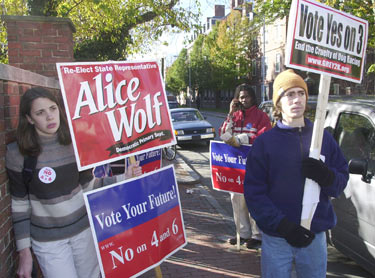Election raises questions about Electoral College process

With the outcome of the 2000 presidential election very much in doubt, American voters are left grappling with the prospect of having elected a chief executive without a popular mandate.
The dilemma arises amid the possibility of Texas Gov. George W. Bush taking office with a plurality of Electoral College votes while amassing fewer popular votes than Vice President Al Gore. Of course a recount in Florida could change the outcome, but for the moment it seems the system has been turned upside down.
How the public will react to such a scenario is a matter of concern for Thomas Patterson, Bradlee Professor of Government and the Press and co-director of the Vanishing Voter Project, sponsored by the Joan Shorenstein Center on the Press, Politics, and Policy at the Kennedy School of Government (KSG).
“On some level, every vote counts, but if you look at the popular vote this time, Al Gore receives the most votes, but it looks like he will not be the next president of the United States,” Patterson says. “So on that level, not every vote does count in a strict sense. The votes that count more are those in very close states that are critical in the Electoral College.”
In this instance the most critical state is Florida, where, as of yesterday, Gore was trailing Bush by fewer than 2,000 votes out of almost 6 million cast. The Sunshine State is a treasure for presidential candidates – with a total of 25 electoral votes. Those votes will determine the next president.
The genesis of the Electoral College dates back to the Constitutional Convention in the 1780s, when the nation’s founders drafted the rules that would dictate the structure of the government. “The framers of the Constitution thought that if they made the presidency a directly elected office then too much power would flow to that office … and upset a balance they were trying to create among the institutions,” Patterson says.
Only a handful of presidents have been elected without winning the popular vote, most recently in 1888 when Benjamin Harrison defeated Grover Cleveland by sweeping the northern states and winning the Electoral College. Throughout the years there have been hundreds of congressional attempts to revamp the electoral process, all of which fell by the wayside.
“If you were writing the Constitution today, [the Electoral College] probably wouldn’t be there, but we must live within these structures,” Patterson states. “You could make a lot of arguments that America in 2000 is very different than the America in 1787, and some of what’s in our Constitution wouldn’t be there now, but I don’t know how much we get from thinking in those terms.
“The real question is what we do today about the institution given this outcome, and the question is whether we can get a reasonable national debate going.”
That national debate will begin, Patterson believes, if the preliminary results from this week’s election hold up and Bush is sworn into office in January.
“When you get something that seems to be less than a democratic result, that’s where you get the impulse for changing the structure,” Patterson explains. “The question always is how long the impulse lasts and the degree to which self-interest rises and competes with the broad public interest in terms of trying to bring about change.
“We will have a moment when the impulse will be here. There certainly will be legislation introduced in both the House and the Senate to get rid of the Electoral College, but we’ll just have to wait and see what happens when push comes to shove and … whether those who are advantaged by the current system are ready to give that advantage up,” he says.
Many small states benefit by the structure, Patterson explains, because their share of the total Electoral College vote is actually larger than their percentage of the popular vote. Larger states also benefit, he maintains, since their huge electoral counts are plums for the candidates in a winner-take-all system.
Only a Constitutional amendment can change the Electoral College structure. That would require a two-thirds majority vote in both the House and the Senate and a majority vote in three-quarters of the state legislatures. The Constitution has been amended 27 times in history, most recently in 1992 when enough states ratified a measure allowing lawmakers in Congress to vote themselves a pay raise.
Whether or not there is enough support in Washington and across the country to approve an amendment either eliminating or reforming the Electoral College is questionable. “It’s anyone’s guess on whether this could happen,” Patterson says. “The dynamics of this Congress will be very interesting, and you really need a bipartisan coalition [to do it]. If either party resists it, it won’t happen.”
If it does happen, however, the voters can expect different styles of presidential campaigns in the future.
“It will change the dynamics of the campaign because state boundaries won’t matter,” Patterson explains. “What will matter will be population densities, so you will get a campaign that is organized much more around media markets than state boundaries. Certainly [a state like] Florida would still be in play, but it would be in play in terms of the Miami media market and the Tampa media market, so it will become even more of a media-based campaign.”
In that scenario, according to Patterson, the candidates would conduct “tarmac campaigning,” in which they would fly into a major city, hold a rally at the airport, conduct interviews with major media, then fly off to the next city. Such a pace would leave little room for candidates to spend time in small towns and rural areas where voters are more dispersed.
“If you’re playing for voters [instead of electoral votes] it’s a different ballgame,” Patterson admits. At issue now is whether or not the American people and their political leaders are prepared to change the rules of the game.




